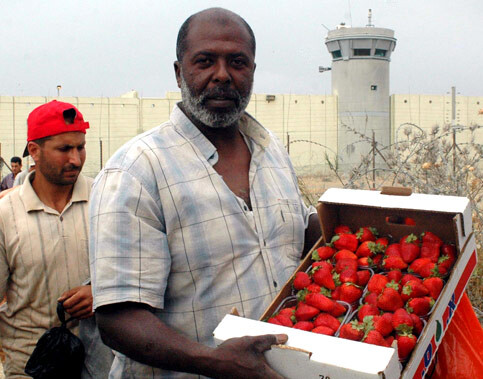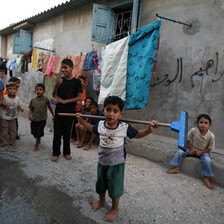The Electronic Intifada 14 May 2007

Palestinians sell produce near the wall in the West Bank city of Qalqilia, 11 May 2007. (Khaleel Reash/MaanImages)
It should have happened sooner, but at least it has happened now. Israel has been exposed by the august World Bank for its oppressive control of the West Bank. Three weeks before global protests begin against 40 years of Israel’s occupation, the report reveals what every government knows, but not one has been prepared to stop. Effectively, the report challenges the notion of a viable two-state solution under Israel’s current restrictions and illegal land appropriations. According to the report, the West Bank has been fragmented into 10 isolated non-contiguous ghettoes which is an impossible configuration for any viable state, and this is made even more bizarre by the presence of some 250,000 illegal Jewish settlers (excluding those in East Jerusalem) who exercise control over 50 percent of the West Bank. And the Wall, says the report, exceeds at times Israel’s security needs and seems rather to contribute to, along with restrictive zoning and land use rules and practices, Jewish settlement expansion.
The Bank’s report is timely and welcome, but curiously it does not mention the effects of the sanctions that the West and Israel imposed on the Palestinians at the beginning of last year. At the time, the World Bank had stated that the Palestinian economy would shrink by 27 percent in 2006 — “a one year contraction that compares to the Great Depression in the US”. In other words, the Palestinian economy was in danger of collapse even then and the warnings were not acted upon. Instead, the world cavalierly continued with its sanctions because it did not approve of the newly elected Hamas government — democratically elected in fair and transparent elections overseen by former US president Jimmy Carter. Now, the World Bank is ratcheting up its dire warnings about the prohibitive restrictions that have decimated the Palestinian economy: as long as the political situation remains unresolved and the economy continues to depend on foreign assistance simply for survival, there is very little prospect of a sustainable economic recovery. Certainly not the sort of sustained growth rates that can provide decent living standards for an expanding population. Any reversal of the situation, says the report, would have to entail dismantling Israel’s grid of physical and administrative barriers.
These catastrophic conditions have been apparent for years, which makes one wonder about the real intentions of the world’s leaders, especially since so much energy has been wasted trying to negotiate a two-state solution according to the long-irrelevant Road Map. Not only does the report point to the physical barriers of checkpoints, roadblocks, walls, gates and no-go zones, but it reveals Israel’s complex permit system which seriously affects the freedom of Palestinians to move anywhere. The permits and IDs are mind-boggling, not just because they are needed to move, but because they are necessary at all inside the West Bank which was designated as part of the future Palestinian state by the Oslo Accords in 1993. Israel, however, is undeterred and continues its settlement expansion and Judaisation of Jerusalem without any regard for the human misery and frustration caused by such entrapment. The fact that the number of obstacles has risen — 44 percent higher than at the signing of the Agreement on Movement and Access in November 2005, according to UN OCHA data on which the report relied — only confirms Israel’s deliberate intent to paralyse the Palestinian economy, further disintegrate Palestinian society and render any viable Palestinian state forever impossible.
Israel’s myth-making about an inferior, uncivilised, violent people does not square with Nobel Laureate Professor Joseph Stiglitz’s description of the Palestinians and their economy when he was Chief Economist at the World Bank in 1997. He said then: “The Palestinian economy is blessed with excellent people. Its general development indicators — including life expectancy, literacy and child mortality rates — are among the best in the Middle East and North Africa region.” If one considers the unrelenting punishing controls being exerted on the Palestinians, it is a wonder that they have survived the attacks on their society and economy at all. However, their resourcefulness which has sustained them thus far, will be no use once Israel’s impenetrable maze of dead-ends is completed. If the world allows that to happen, the problems besetting the Palestinians will take on a much more frightening dimension. Israel has yet to provide an answer for what it plans to do with almost 3 million people in the West Bank deprived of their land, water, homes, and liberty. There are not too many solutions left.
The most tragic thing in all this is that so many Palestinian lives have been lost and wasted — and continue to be — in the living hell Israel has been allowed to construct while the world falls over itself to defend Israel’s right to exist and its right to defend that existence. Not a word is said about the rights of Palestinians crying out to be recognised under Israel’s occupation. The World Bank’s report this time is absolutely clear, making our legal and moral culpability for the consequences even more onerous if we do not help the Palestinians. We ignore the report’s findings at our peril.
Sonja Karkar is the founder and president of Women for Palestine in Melbourne, Australia. See www.womenforpalestine.com.
Related Links





